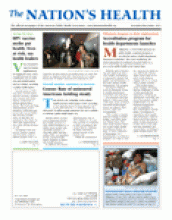Workers struggling to make ends meet in a down economy faced even greater challenges this year as the cost of employer-sponsored health insurance premiums outpaced wages.
According to a Kaiser Family Foundation survey published in September, the average annual premiums for family coverage reached $15,073 in 2011 — a 9 percent increase over the previous year and sharply higher than the 3 percent family premium increase in 2009–2010. The cost for worker-only — or single — health coverage rose as well, with average annual premiums for such coverage reaching $5,429 in 2011, up 8 percent over the previous year, according to the survey.
By contrast, workers’ wages increased only 2.1 percent in 2011, while the U.S. inflation rate exceeded 3 percent, according to the survey. Published each year since 1999 to examine trends in employer-sponsored health coverage, this year’s survey found annual premiums have increased 113 percent since 2001, compared with 34 percent for workers’ wages.
“This year’s 9 percent increase in premiums is especially painful for workers and employers struggling through a weak recovery,” Kaiser President and CEO Drew Altman, PhD, said in a September statement releasing the survey results.
Examining health benefits data from more than 3,000 nonfederal private and public employers with three or more workers, the survey found that 60 percent of firms offered health benefits to their workers in 2011, down from 69 percent in 2010. On average, employees kicked in about $4,129 toward the cost of annual premiums for family health plans in 2011, while their employers picked up about $10,944 of the cost. Employees with single coverage chipped in, on average, $921 toward the cost of their annual premiums, with their employers footing the remainder, or about $4,500.
Published in partnership with Health Research and Education Trust, the survey also found that the number of workers enrolled in high-deductible health plans continues to rise as employers look for more affordable coverage options and shift increased costs to workers. Fully 17 percent of covered workers were enrolled in high-deductible health plans in 2011 as compared with 13 percent in 2010 and 8 percent in 2009. According to the survey, a growing number of employees are opting for high-deductible plans because such plans include tax-preferred savings options, including health savings accounts. But while such plans have lower premiums, workers often face annual deductibles as high as $1,200 for single coverage and more than $2,000 for family coverage.
The survey also found that 98 percent of workers with employer-sponsored health insurance have prescription drug coverage and nearly all share the cost of their prescriptions.
Looking at the data through the lens of health reform, about 2.3 million young adults were added to their parents’ family health insurance plans in 2011 as a result of a provision in the Affordable Care Act that allows workers’ adult children to be covered on their parents’ plans until age 26.
“The law is helping millions of young adults to obtain health coverage,” said lead survey author Gary Claxton, co-executive director of the Kaiser Initiative on Health Reform and Private Insurance. “In the past, many of these young adults would have lost coverage when they left home or graduated college.”
Employer-sponsored insurance is the leading source of health insurance in the United States, covering about 150 million nonelderly people, according to the survey.
For more information or to access the survey, “Employer Health Benefits: 2011,” visit http://ehbs.kff.org.
- Copyright The Nation’s Health, American Public Health Association









